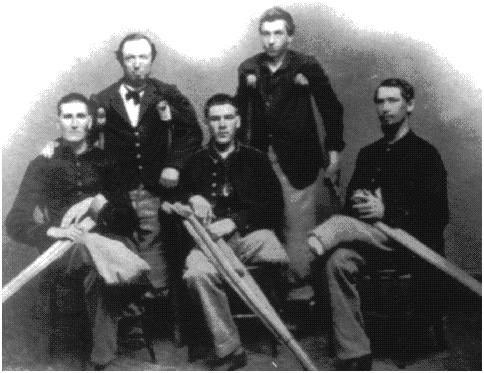
J. Gallant, L. Milam
©2000 Mho & Mho Works
San Diego
Wars & HistoryPart IIThere was also the Revolutionary War. When the colonists took up arms against the Mother Country, England sent over an army of redcoats and Hessian mercenaries to restore order. The English invasion force landed at New York Harbor, but they were held up for several weeks by the U. S. Immigration and Naturalization Service, which insisted on checking every trooper's passport, vaccination certificate, background, politics, and school record. When the English finally disentangled themselves from the INS, they were set upon by an army of catchpools and cutpurses who robbed them of half their muskets, three-cornered hats, and hub-caps.The English bravely fought their way up the West Side Drive, despite heavy traffic, and then took the George Washington Bridge to New Jersey, with the aim of suppressing the rebels in Piscataway. The colonists responded by naming their commander-in-chief after the bridge, and fell back. Adopting guerrilla tactics, they harried the English troops day and night with sorties, ambushes, scurrilous graffiti, and late night telephone calls. The constant ringing of the telephone played havoc with the English command and control system, which was already confused enough by the Hessians who spoke no English --- and barely spoke Hessian for that matter. When the English directed them to dig trenches, they misunderstood and occupied Trenton.
In the meantime, the colonists retreated to Valley Forge, and named themselves the Continental Army because all they took for breakfast was coffee and a cruller, or maybe a piece of Danish. That winter at Valley Forge was a dark time for the colonials. They had too little to eat at breakfast and they damn near froze to death because they had left home in such a hurry they forgot to bring their woolies, furry long-johns, and blankies.
Shivering around their campfires, they listened to rousing revolutionary speeches by their leaders, which made them hot. Sam Adams cried, "No taxation without representation," and John Adams cried, "No taxation with representation," which became a credo for future generations.
General Washington was an inspiration to them all, for no matter how cold it was, his teeth never chattered. He also steadfastly refused to reveal whether his birthday was on February 12 or 22, and to this day nobody knows. Every day, the Marquis de Lafayette, an aristocratic European volunteer, trained the colonial troops in the use of the bayonette, the rapier, the boning knife, the Mouli-julienne, and the poultry shear. Gradually, the Continental Army was transformed from a rag-tag mob (El Bunche Pendejo) into a disciplined kitchen staff.
In the Spring, the Continental Army sallied forth from Valley Forge, their spirits restored. In a brilliant tactical stroke, General Washington bypassed Trenton entirely, as everyone has done ever since, and threatened the mercenaries' right flank at South Orange. The Hessians moved to turn Washington's left flank at West Orange, but he gave them the slip at East Orange and regrouped in Nutley. The Hessians went in pursuit, but confused by New Jersey's famous traffic circles, took the wrong exit at Weehawken, where they marched right into the redcoats, who were doing close-order drill. In the meantime, the Colonials invested Tenafly, while General Washington stood up in a boat to cross the Passaic River, and led the storming of Teaneck.
When the colonial troops finally entered Philadelphia in triumph, the redcoats threw in the towel, and their Commander-in-Chief, General Burgandy, surrendered his poultry shears to General Washington. The English took their armies back to the mother country, put King George away in a pub called "The Golden Codpiece," (El Pedazo de Bacalao de Oro) and got on with the Industrial Revolution. As a result, the English invented Marmite, and the United States were left to go their own way, and invent the cheeseburger.
In Philadelphia, the revolutionary leaders Sam Adams, John Adams, Adam Smith, Smith Barney, Tom Paine, Peter Paine, and Paine Webber locked themselves up for the summer until they could come up with a name for Constitution Hall. To this day, most everyone else has a similar problem with Philadelphia, viz., "I spent a whole summer in Philadelphia one weekend."
The Civil WarThe war we like the best of all is the Civil War (La Guerra Civil). It started because a man by the name of Dreadful Scott was not a person so the North invaded the South and a million or so people died. The most interesting battle was given at Gettysburg. Gettysburg has since been turned into a Theme Park and Civil War fans come to visit dressed up in "Yankee" and "Rebel" uniforms. Using genuine modern antique bayonets, muskets, and cannon balls, they battle it out with each other. Afterwards, they sicken with cholera, gangrene, and the pox, and die like flies.
